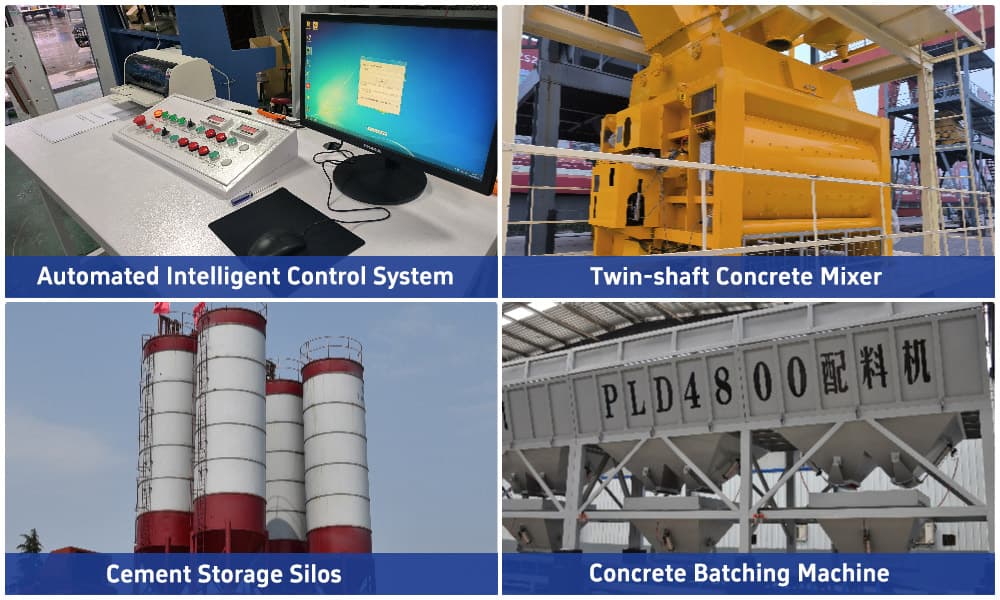How much does a 30m3/hr concrete batching plant cost?

As a practitioner with many years of experience in purchasing concrete batching plants, I am often asked " How much does a 30 cubic metre/hour concrete batching plant cost? " This question. The answer is not set in stone, and the cost is affected by many factors. In this article, we will analyse the key factors affecting the cost of 30m3/hour concrete batching plant from a professional point of view, and provide some practical purchasing suggestions.
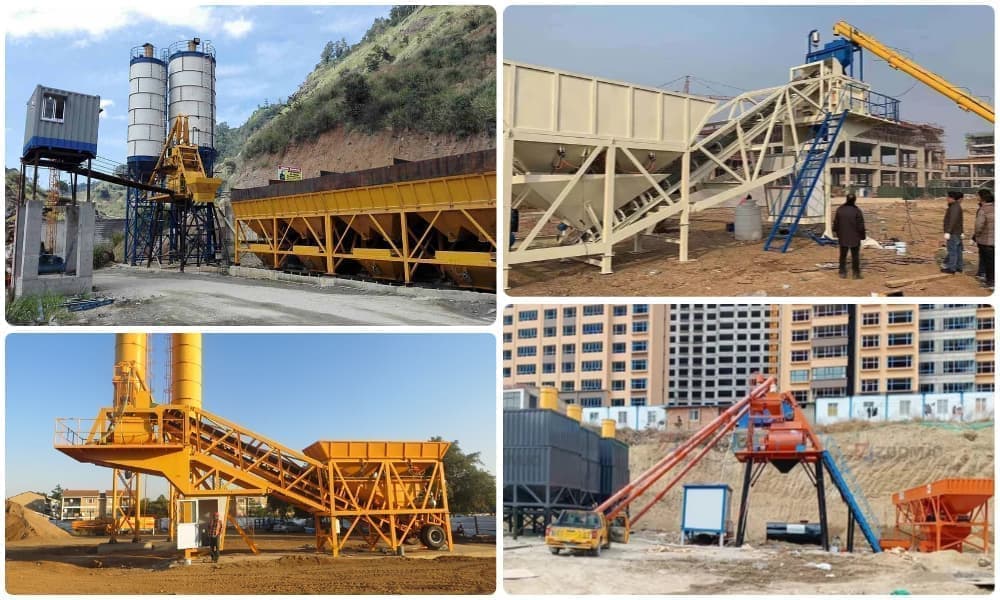
Key factors affecting the cost of a concrete batching plant
A concrete batching plant of 30 cubic metres per hour usually corresponds to a small concrete mixing plant in the industry, such as the HZS35 type. This type of plant is widely used in small and medium-sized construction projects, precast production and commercial concrete supply. The purchase cost of the equipment varies greatly, usually between $30,000 and $85,000, and the exact price will be affected by a number of factors, which will be analysed in detail below.
Batching Plant Types
There are two main types of concrete batching plants, stationary and mobile, which differ significantly in terms of features, application scenarios and costs.
1. Stationary Concrete Batching Plant
Features:
-
Long-term installation: Requires long-term installation in a specific location and is not easy to move.
-
High production capacity: Suitable for large-scale, continuous concrete production needs, capable of supplying large quantities of concrete in a stable and efficient manner.
-
Complex system: The equipment is well configured, including mixer, batching machine, cement silo, weighing system, conveying system, etc., with high degree of automation and coordination.
Applicable Scenario:
-
Large-scale construction projects: such as high-rise buildings, bridges, tunnels, water conservancy projects, etc., which require continuous and stable supply of concrete.
-
Prefabricated components production: suitable for the production of various prefabricated components, and can accurately adjust the concrete ratio according to the needs.
-
Large-scale commercial concrete production plant: to meet long-term, large quantities of market demand.
-
Cost and Investment: Higher initial investment, but relatively low long-term operating costs due to large-scale production and high efficiency.
Stationary batching plants can also be classified into hopper type and belt type according to the method of aggregate delivery. Hopper type is suitable for small projects with low production demand and is economical and practical; belt type is suitable for continuous production and is more efficient.
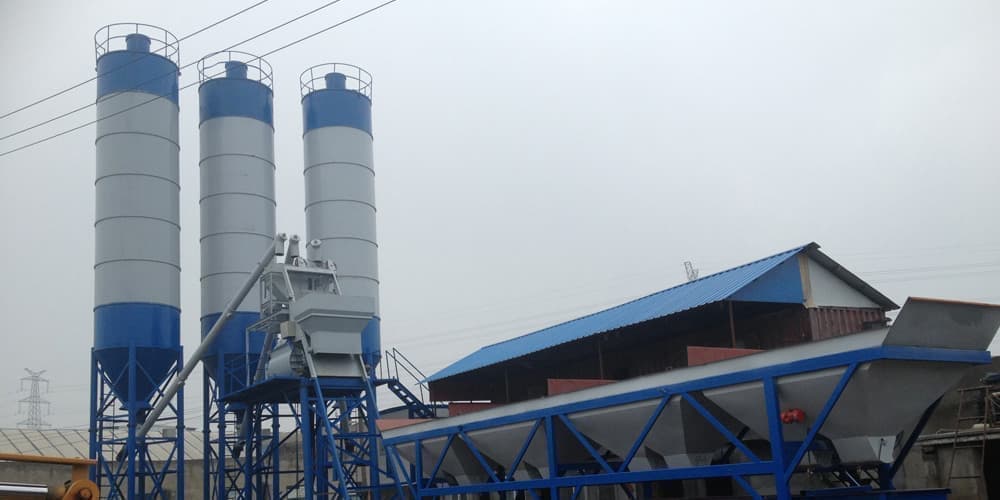
2. mobile concrete batching plant
Features:
-
Flexibility: Compact structure, easy to disassemble and transfer, able to quickly transfer the construction site.
-
SIMPLE SYSTEM: Relatively simple equipment configuration, usually including mixer, batching plant, control room, etc., fast installation and movement.
-
Good mobility: can be flexibly deployed in different locations according to the needs of the project.
Applicable Scenarios:
-
Temporary works: such as roads, railways, bridges and other linear works, projects with short construction period and scattered locations.
-
Minor works: suitable for projects with small amount of works.
-
Site-restricted projects: mobile mixing plant is more advantageous in the case of small construction sites.
-
Cost and Investment: The initial investment is relatively low, but frequent moving and dismantling may increase transport and maintenance costs.
When choosing a batching plant, you need to consider the scale of the project, duration, location, budget and other factors to choose the right type. For example, mobile batching plant is a better choice for small and medium-sized projects that require frequent changes of construction sites; for large-scale long-term projects or commercial concrete production, fixed batching plant is more advantageous.
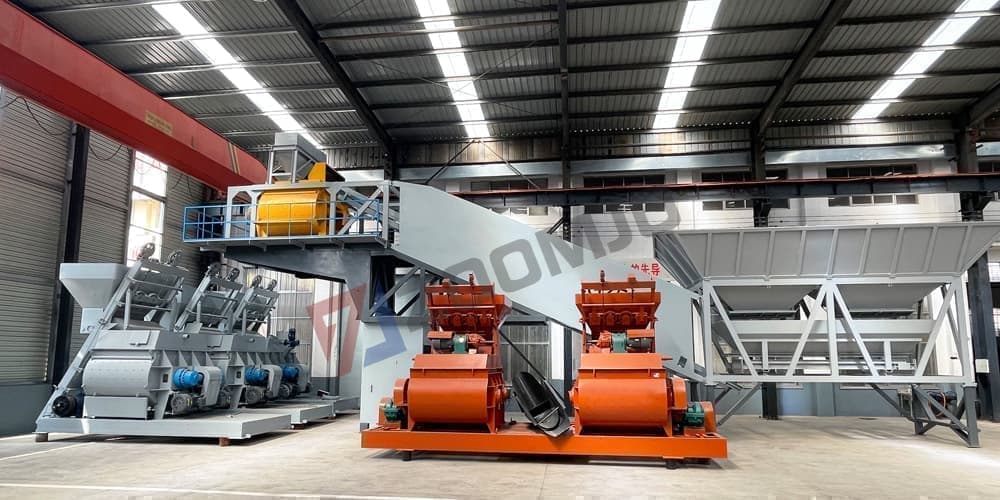
The impact of components and configuration on cost
The cost of a concrete batching plant is not only affected by the type, but also the configuration of its core components and the degree of automation, which are directly related to the price and performance of the plant.
1. Mixing host
The mixing host is the core component of the batching plant, which directly determines the concrete mixing quality and production efficiency.
-
Double horizontal shaft forced mixer, such as JS750 type, is a commonly used high-performance mixing machine, which has the advantages of good mixing quality, high efficiency, etc. Compared with other types of mixers, the price is higher, but it can ensure the uniformity of concrete. Compared with other types of mixers, the price of double horizontal shaft forced mixer is higher, but it can ensure the uniformity and quality of concrete, especially suitable for the production of high grade concrete.
-
Other types of mixers: such as single horizontal shaft mixer, disc mixer, etc., the structure is relatively simple, the price is lower, but the mixing performance may not be as good as double horizontal shaft forced mixer.
2. Metering system
Aggregate (sand, stone), powder (cement, fly ash), water and admixture metering accuracy directly affects the performance of concrete and quality stability.
-
Electronic scale measurement: It is the mainstream measurement method at present, with the advantages of high precision and good stability. The use of high-precision electronic scales and sensors can minimise the measurement error.
-
Other measurement methods: such as volumetric measurement, precision is relatively low, the cost is also low, but it is easy to cause material waste and fluctuations in the quality of concrete.
3. Control system
The control system is responsible for the automatic operation and monitoring of the batching plant, which directly affects the production efficiency, operation convenience and safety.
-
Automation control system: PLC (Programmable Logic Controller) and computer control are adopted, which can realise the automation control of batching, mixing and unloading. It adopts imported or high-end brand PLC and control software, which has more stable performance and stronger function.
-
Manual/semi-automatic control system: relatively simple, lower cost, but requires more manual operation, easy to produce human error.
Common 30 cubic metre/hour concrete batching plant component configuration table
HZS35 stationary concrete batching plant is a very common and classic model in 30 cubic metre/hour class. Typical configurations of HZS35 type concrete batching plant will be described in detail below:
| System/Components | Model/Specification (example) | Main Functions/Features | Technical parameters (example) | Remarks | |
|---|---|---|---|---|---|
| Mixing system | Mixing machine | JS750 Double Horizontal Shaft Forced Mixer | Forced mixing, high efficiency, even mixing quality; suitable for all kinds of concrete; wear-resistant liners and blades. | Mixing drum capacity: 750L; mixing motor power: 30kW (or more); productivity: theoretical 35m³/h | Different models of mixer can be optional, such as JS500, JS1000, etc., which can be selected according to the actual demand and manufacturer's recommendation. |
| Batching system | Aggregate batching machine | PLD1200/PLD1600 (three/four bins) | Electronic weighing, high precision; can be configured with different number of bins to store different specifications of aggregates. | Number of bins: 3 or 4; Single bin capacity: according to model; Batching accuracy: ±2%. | According to the type of aggregate, you can choose the appropriate model of batching machine and the number of bins. |
| Powder system | Cement silo | 50 tonnes/100 tonnes (1-2 optional) | Storage of cement or other powdery materials (fly ash, mineral powder, etc.); with dust collector, material level meter, arch-breaking device. | Capacity: 50 tonnes/100 tonnes (or other specifications); Quantity: 1-2 pieces | The capacity and quantity of cement silo are determined according to the amount of cement used and the storage cycle. |
| Powder system | Screw conveyor | LSY219/LSY273 | Conveying cement or other powder materials from cement silo to metering hopper. | Select the model according to the height of cement silo and conveying distance. | --- |
| Powder metering system | Powder metering system | Electronic scale metering | Accurate measurement of powder. | High metering accuracy. | --- |
| Liquid metering system | Water metering systems | Flow meters / electronic scales | Accurate measurement of water consumption. | High metering accuracy. | --- |
| Liquid metering system | Additive dosing system | Metering pump/electronic scale | Accurately measure the amount of admixture, can be configured with a variety of admixture metering devices. | Can be configured as required. | --- |
| Control system | PLC control (semi/full-automatic) | Control batching, mixing, unloading and other links; high degree of automation, easy to operate; data storage, report printing and other functions. | Semi-automatic or full-automatic control is optional. | Full-automatic control system can improve production efficiency and management level. | |
| Conveying system | Aggregate conveying | Belt conveyor | Conveys the aggregate from the batching plant to the mixing plant. | Select the appropriate model according to the conveying distance and angle. | Flat belt or trough belt is available. |
| Auxiliary equipment | Air compressor | 7.5kW (or other power) | Provides air supply for controlling pneumatic components. | Selected according to the number of pneumatic elements and the amount of air used. | --- |
| Auxiliary equipment | Water pump | Selected according to water supply requirements | Provide water source. | Selected according to water supply distance and flow rate. | --- |
| Auxiliary equipment | Dedusting system | Pulse dust collector (or other types) | Reduce dust pollution and meet environmental protection requirements. | Selected according to environmental protection requirements and dust amount. | Dust removal effect directly affects the environmental protection to meet the standard. |
Key Notes:
Parameters are for reference only: the technical parameters in the table are examples of common configurations, and the specific parameters may vary depending on the manufacturer, model and actual demand. When choosing equipment, please be sure to ask the manufacturer of the mixing plant for detailed technical parameters.
Brand & Quality
Choosing concrete batching plants from well-known brands (such as Sany Heavy Industry, Zoomlion, ZOOMJO, etc.), although the initial investment is higher, they are more stringent in the manufacturing process, raw materials and quality control, and can provide more reliable equipment quality and after-sales service, thus reducing the maintenance and replacement costs in the later stage. The equipment of some small manufacturers has a relatively low price, but the quality and after-sales service may not be fully guaranteed, so you need to be careful when purchasing and try to choose manufacturers with good reputation and quality assurance.
Purchase area (including export)
Purchasing region has a significant impact on the total cost of concrete batching plant, mainly in the aspects of transport and trade.
-
Domestic purchase: Transportation cost varies greatly from region to region. If the purchase place is far away from the manufacturer, the transport cost will increase, which will raise the total cost of the batching plant. In addition, some remote areas may have inconvenient logistics problems, which will also affect the transport and installation of the equipment.
-
Export Purchase: Concrete batching plants exported to foreign countries have more complex influencing factors, mainly including:
-
Transport costs: Sea/land transport distances, mode of transport (container/bulk), port charges, and inland transport all affect transport costs.
-
Tariffs and Trade Policies: Import tariffs vary from country to country and region to region, and trade agreements and barriers can also affect the final cost of the equipment.
-
Logistics and Customs Clearance: Logistics efficiencies, customs clearance procedures, and inspection and certification requirements will all affect the transit time and delivery cycle of the equipment.
Additional equipment
In order to meet the production demand, additional equipment such as silos (for storing cement, fly ash and other powders), conveyors (for transporting aggregates) and other equipment may be required, and their specifications and quantities will have a direct impact on the cost. In addition, auxiliary equipment such as loaders, weighbridges, sand separators, etc. are also essential in the concrete production process, and their prices and configurations will also affect the total cost.
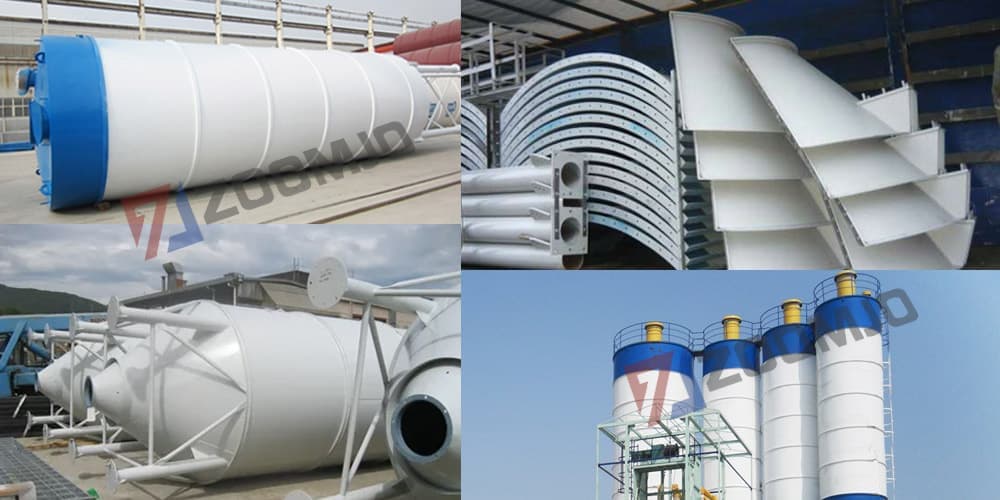
Selection of Used Concrete Batching Plant
In addition to new equipment, a well-performing and fully functional used 30 cubic metre per hour concrete batching plant is also an option worth considering. Prices for this type of used equipment typically range from US$25,500 to US$50,000, depending on factors such as the brand, year, condition of use and configuration of the equipment.
However, purchasing used equipment requires extra caution. If the price quoted is well below the market average, e.g. below $25,000, it is all the more important to carefully check the condition of the equipment, especially the following key components:
-
Mixing Main Unit: Check the wear and tear on the inside walls of the mixing drum, the wear and tear on the mixing blades, the lubrication and wear and tear on the bearings, etc.
-
Batching system: Check the load cells of the batching plant for sensitivity and accuracy, the wear and tear of the conveyor belts, and the sealing of the bins.
-
Control system: check whether the electric components are aging, whether the control programme is stable and whether the operation interface is normal.
-
Other parts: Check the condition of cement silo, conveying pipeline, air compressor and other parts.
If the equipment is found to have serious wear and tear, requiring extensive repairs or replacement of parts, it is necessary to consider carefully and avoid purchasing, so as not to invest too much maintenance costs later, which is ultimately not worth the loss. It is recommended to carry out a comprehensive on-site inspection and test run before purchase, and it is best to ask a professional construction machinery appraiser to carry out an assessment to ensure that the purchase of cost-effective used equipment is reasonable.
Summary
In summary, the cost of a 30m3/hour concrete batching plant is affected by a combination of factors. When choosing the equipment, you need to fully weigh the type of batching plant (fixed or mobile), the technical level of the core components, the brand reputation, the region where you are located, and the additional ancillary equipment required to ensure that the equipment is stable in performance, reliable in quality, and fully meets the actual production requirements. If you are planning to purchase a concrete mixing plant, it is recommended that you consult a professional concrete mixing plant manufacturer directly to get the latest product quotation and detailed configuration list in order to make the most informed decision.
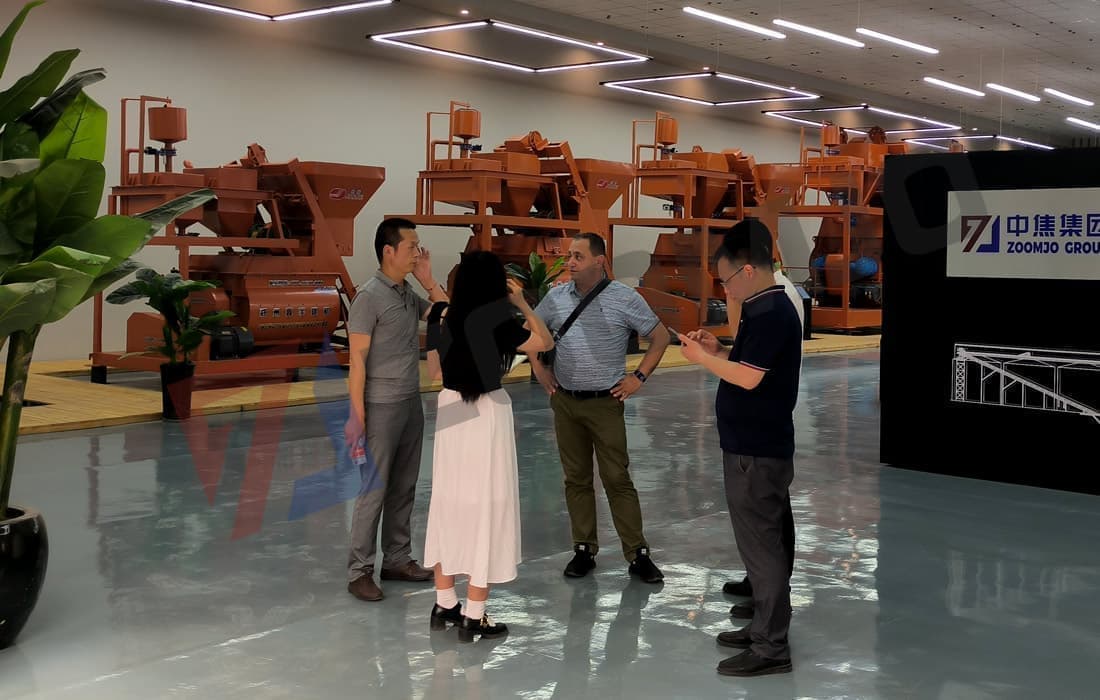
Best Concrete Batching Plant Manufacturer Recommendation
Below are a few well known concrete batching plant manufacturers and their company profiles:
ZOOMJO GROUP
ZOOMJO GROUP is a concrete mixing plant company that integrates research and development, manufacturing, sales and service. Its product line covers HZS series stationary concrete mixing plant, YHZS mobile concrete mixing plant, and foundationless concrete batching plant for quick installation and production, etc. ZOOMJO, with its strong technical strength and perfect production system, ensures reliable product quality and excellent performance, which is trusted by customers.
Sany Heavy Industry
Sany Heavy Industry is one of the leading construction machinery manufacturers in China, specialising in the research, development and production of concrete machinery. Its HZS series concrete mixing plant is known for its high efficiency and stable performance, and is widely used in various infrastructure construction projects.
Zoomlion
Zoomlion is another manufacturer with an important position in the field of concrete machinery. Zoomlion's mixing plants have performed well in a number of projects, especially in water conservancy projects and high-speed railway construction, providing high-quality concrete guarantee.

 English
English  Español
Español  简体中文
简体中文  Pусский
Pусский  українська
українська 